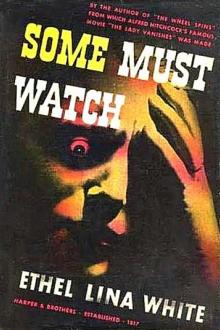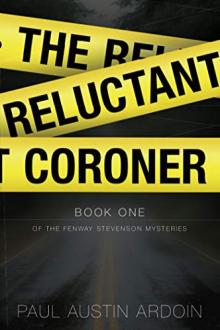Genre Mystery & Crime. Page - 6

himself; for the Coroner, if you know what that means."
"But what if she's alive! Those things will crush her. Let us take them off. I'll help. I'm not too weak to help."
"Do you know who this person is?" I asked, for her voice had more feeling in it than I thought natural to the occasion, dreadful as it was.
"I?" she repeated, her weak eyelids quivering for a moment as she tried to sustain my scrutiny. "How should I know? I came in with the policeman and haven't been any nearer than I now be. What makes you think I know anything about her? I'm only the scrub-woman, and don't even know the names of the family."
"I thought you seemed so very anxious," I explained, suspicious of her suspiciousness, which was of so sly and emphatic a character that it changed her whole bearing from one of fear to one of cunning in a moment.
"And who wouldn't feel the like of that for a poor creature lying crushed under a heap of broken crockery!"
Crockery! those Japanese vases worth hun

e a real getaway. All I needed to lay hands on him was a good description."
"Description?" echoed Whipple. "Your agency's got descriptions on file--thumb prints--photographs--of every employee of this bank."
"Every one of 'em but Clayte," I said. "When I came to look up the files, there wasn't a thing on him. Don't think I ever laid eyes on the man myself."
A description of Edward Clayte? Every man at the table--even old Sillsbee--sat up and opened his mouth to give one; but Knapp beat them to it, with,
"Clayte's worked in this bank eight years. We all know him. You can get just as many good descriptions as there are people on our payroll or directors in this room--and plenty more at the St. Dunstan, I'll be bound."
"You think so?" I said wearily. "I have not been idle, gentlemen; I have interviewed his associates. Listen to this; it is a composite of the best I've been able to get." I read: "Edward Clayte; height about five feet seven or eight; weight between one hundred an

ourt judge, was found by the police at his home, Riversbrook in Tanton Gardens, Hampstead, to-day. Deceased had been shot through the heart. The police have no doubt that he was murdered."
But the morning papers of the following day did full justice to the sensation. It was the month of August when Parliament is "up," the Law Courts closed for the long vacation, and when everybody who is anybody is out of London for the summer holidays. News was scarce and the papers vied with one another in making the utmost of the murder of a High Court judge. Each of the morning papers sent out a man to Hampstead soon after the news of the crime reached their offices in the afternoon, and some of the more enterprising sent two or three men. Scotland Yard and Riversbrook were visited by a succession of pressmen representing the London dailies, the provincial press, and the news agencies.
The two points on which the newspaper accounts of the tragedy laid stress were the mysterious letter which had been sent to

Tower, Morgan discovered that he had saved as much money for his old age as a sensible man could want; that he was tired of the active pursuit--or, as he termed it, of the dignified quackery of his profession; and that it was only common charity to give his invalid brother a companion who could physic him for nothing, and so prevent him from getting rid of his money in the worst of all possible ways, by wasting it on doctors' bills. In a week after Morgan had arrived at these conclusions, he was settled at The Glen Tower; and from that time, opposite as their characters were, my two elder brothers lived together in their lonely retreat, thoroughly understanding, and, in their very different ways, heartily loving one another.
Many years passed before I, the youngest of the three--christened by the unmelodious name of Griffith--found my way, in my turn, to the dreary old house, and the sheltering quiet of the Welsh hills. My career in life had led me away from my brothers; and even now, when we are all u

escription, but that was to be looked for and discounted. And she had remembered, at the end, to include her ostensible reason for telling the story.
"Yes, it must have been dreadful," he sympathized. "Odd, though, that an old hand with guns like Mr. Fleming would have an accident like that. I met him, once or twice, and was at your home to see his collection, a couple of years ago. He impressed me as knowing firearms pretty thoroughly.... Well, you can look for me tomorrow, say around two. In the meantime, I'll see Goode, and also Gresham and Arnold Rivers."
CHAPTER 2
After ushering his client out the hall door and closing it behind her, Rand turned and said:
"All right, Kathie, or Dave; whoever's out there. Come on in."
Then he went to his desk and reached under it, snapping off a switch. As he straightened, the door from the reception-office opened and his secretary, Kathie O'Grady, entered, loading a cigarette in

said--" only every winter it was a different "he."
In my wash-stand drawer I'd kept all the clippings about her coming out and the winter she spent in Washington and was supposed to be engaged to the president's son, and the magazine article that told how Mr. Jennings had got his money by robbing widows and orphans, and showed the little frame house where Miss Patty was born--as if she's had anything to do with it. And so now I was cutting out the picture of her and the prince and the article underneath which told how many castles she'd have, and I don't mind saying I was sniffling a little bit, for I couldn't get used to the idea. And suddenly the door closed softly and there was a rustle behind me. When I turned it was Miss Patty herself. She saw the clipping immediately, and stopped just inside the door.
"YOU, TOO," she said. "And we've come all this distance to get away from just that."
"Well, I shan't talk about it," I replied, not holding out my hand, for with her, so to speak, next

inute. I'm just catching up with you. You have the barefaced insolence to warn me. I think I'll slap your face."
"Don't," Doan warned. "Carstairs will bite you if you do. Not that he cares anything about me, but he would feel it was a reflection on him."
Melissa looked at Carstairs. He was lying down on the floor with his eyes shut.
"Don't let him fool you," said Doan. "He's ready to go into instant action. He's just pretending he's not interested."
"Hmmm," said Melissa. "You know, this is all sort of fascinating in a repugnant way, and I know I've seen this Trent party before, but I can't remember where. Have you any idea where I could have seen him?"
"Yes," said Doan.
"Well, where?"
"His wife is Heloise of Hollywood."
"Heloise," Melissa repeated. "Of Hollywood. Oh!"
"Oh," Doan agreed.
"Now wait," said Melissa. "Now wait a minute...I know! He's Handsome Lover Boy!"
"Yup," said Doan.
"Stay right here!" Melissa ordered. "I'll b

the residential quarter of a prosperous town. It should have been surrounded by an acre of well-kept garden, and situated in a private road, with lamp-posts and a pillar-box.
For all that, it offered a solidly resistant front to the solitude. Its state of excellent repair was evidence that no money was spared to keep it weather-proof. There was no blistered paint, no defective guttering. The whole was somehow suggestive of a house which, at a pinch, could be rendered secure as an armored car.
It glowed with electric-light, for Oates' principal duty was to work the generating plant. A single wire overhead was also a comfortable reassurance of its link with civilization.
Helen no longer felt any wish to linger outside. The evening mists were rising so that the evergreen shrubs, which clumped the lawn, appeared to quiver into life. Viewed through a veil of vapor, they looked black and grim, like mourners assisting at a funeral.
"If I don't hurry, they'll get between me and the house,

ained that you had a vivid dream, in which you saw your cousin stabbed by a stranger whom you did not know, whose face even you never saw. Sir Alan was undoubtedly murdered. The dagger-like attachment to your Japanese sword had been driven into his breast up to the hilt, actually splitting his heart. To deliver such a blow, with such a weapon, required uncommon strength and skill. I think I describe it here as 'un-English.'"
Brett referred to his scrap-book. In spite of himself, he felt all his old interest reawakening in this remarkable crime.
"Yes?" queried Hume.
The barrister, his lips pursed up and critical, surveyed his concluding notes.
"You were tried at the ensuing Assizes, and the jury disagreed. Your second trial resulted in an acquittal, though the public attitude towards you was dubious. The judge, in summing up, said that the evidence against you 'might be deemed insufficient.' In these words he conveyed the popular opinion. I see I have noted here that Miss Margaret H
